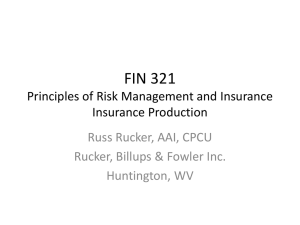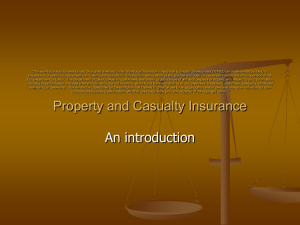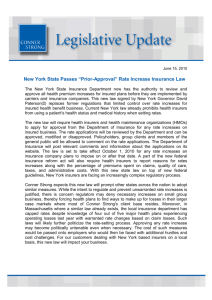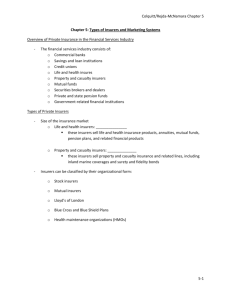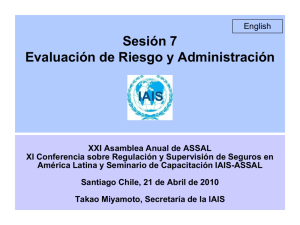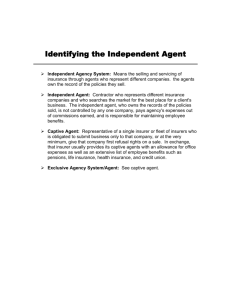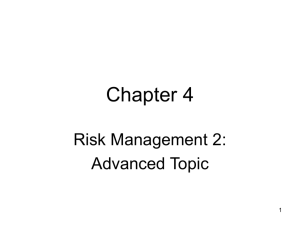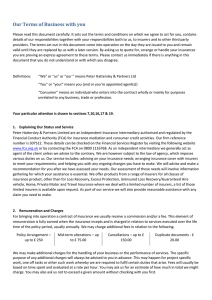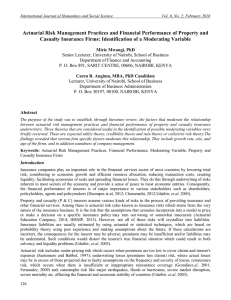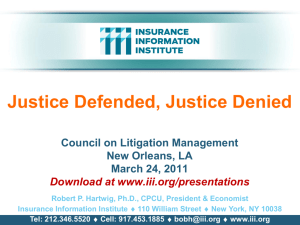Overview of Insurance Operations
advertisement
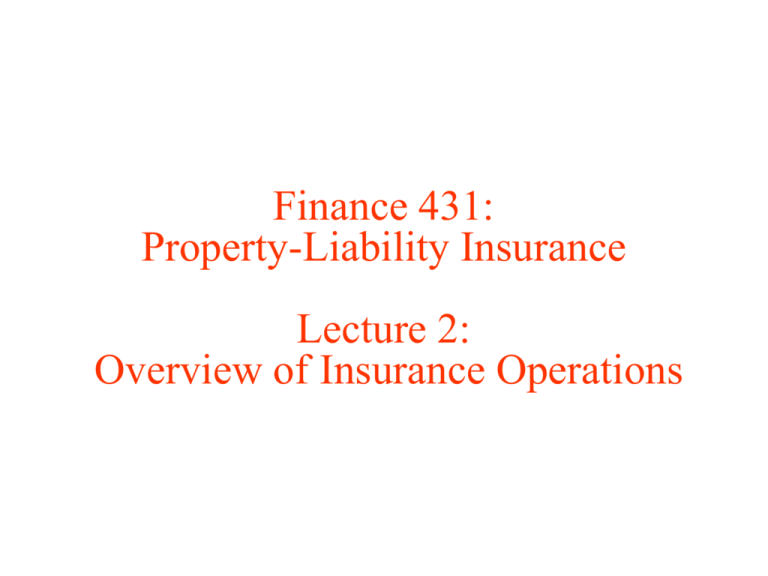
Finance 431: Property-Liability Insurance Lecture 2: Overview of Insurance Operations Registering Your i-clicker • Go to www.iclicker.com (as listed on the back of your i-clicker) • Click on Register ** (on left side of page) • Input your name as requested • Your Student ID is your Net id (your U of I e-mail address before the @) Do not input your UIN • Input your Clicker ID which is listed on the back of your i-clicker • Type in the verification word as indicated • Click Enter Overview of Insurance Operations Types of Insurers Risk Transfer Process Objectives of Insurers Constraints of Achieving Objectives Measurement of Insurer Performance Functions Required to Meet Needs Interdependence Among Functions Types of Insurers Legal Form of Ownership Proprietary Insurers Stock Insurance Companies Lloyds Insurance Exchanges Cooperative Insurers Mutual Insurance Corporations Reciprocal Exchanges Captive Insurers Risk Retention Groups and Purchasing Groups Fraternal Organizations Types of Insurers Other Insurers Health Maintenance Organizations (HMOs) Blue Cross-Blue Shield Banks Pools and Associations Governmental Insurers Workers Compensation Mine Subsidence Federal Insurance Programs What Type of Insurer is State Farm? A) B) C) D) E) Stock insurance company Mutual insurance company Reciprocal exchange Captive insurer None of the above What Type of Insurer is Allstate? A) B) C) D) E) Stock insurance company Mutual insurance company Reciprocal exchange Captive insurer None of the above What Type of Insurer is CNA? A) B) C) D) E) Stock insurance company Mutual insurance company Reciprocal exchange Captive insurer None of the above Place of Incorporation and Licensing Status Domestic - incorporated in that state Foreign - incorporated in another state Alien - incorporated in another country Admitted - licensed to provide insurance in a state Nonadmitted - operating without a license Surplus lines brokers can place business with nonadmitted insurers if admitted insurers will not write the coverage For Illinois Policyholders What Type of Company is Sun Life of Canada? A) B) C) D) E) Domestic Foreign Alien Extraterrestrial None of the above Principal Steps in Risk Management 1. Identify loss exposures 2. Measure loss exposures 3. Evaluate the different methods for handling the risk • • • Risk assumption Risk transfer Risk reduction 4. Select a method 5. Monitor results and implement necessary changes What step in the risk management process would involve estimating that the chance of getting into an automobile accident over the next year is 10%? A) Identify loss exposures B) Measure loss exposures C) Evaluate the different methods for handling the risk D) Select a method E) Monitor results and implement necessary changes What step in the risk management process would involve obtaining a quote for auto insurance? A) Identify loss exposures B) Measure loss exposures C) Evaluate the different methods for handling the risk D) Select a method E) Monitor results and implement necessary changes Risk Transfer Process Risk Manager Consultants Insurance Agents and Brokers Insurers Insurance Functions Policy contract development Pricing Marketing Underwriting Loss adjustment Loss control Reinsurance Investments Objectives of Insurers Profit Objective Customer Needs Objective Determinants of Insurance Cost 1. Losses 2. Expenses 3. Profit Legal Requirement Objective Humanitarian and Societal Objectives Contributions Employee benefits Constraints on Achieving Objectives Internal Efficiency Expertise Size Financial Resources Miscellaneous Market recognition Poor reputation External Regulation Public Opinion Competition Economic Conditions Recession Inflation Investment results Distribution Systems Miscellaneous Catastrophes Measurement of Insurer Performance Profit Measurement Problems in Measuring Profitability Catastrophes Loss Reserve Inaccuracy Premium Volume Impact of Growth Components of Profit Measurement Expense Ratio Loss Adjustment Expenses/Earned Premium Other Expenses/Written Premium Loss Ratio Incurred Losses/Earned Premium Components of Profit Measurement Combined Ratio Statutory Incurred Losses + LAE + Incurred Expenses Earned Premiums Earned Premiums Trade Basis Incurred Losses + LAE + Incurred Expenses Earned Premiums Written Premiums Combined Ratio Example Written Premium Earned Premium Incurred Losses and LAE Underwriting Expenses Statutory Combined Ratio 76 + 19 = 100% 95 95 Trade Basis Combined Ratio 76 + 19 = 99% 95 100 $100 million 95 “ 76 “ 19 “ Components of Profit Measurement Investment Earnings Investment Income Interest Dividends Rents Realized Capital Gains or Losses Unrealized Capital Gains or Losses Operating Ratio Combined Ratio – (Investment Earnings/Earned Premium) Property-Liability Industry Profitability Year 1996 1997 1998 1999 2000 2001 2002 2003 2004 2005 2006 Combined Ratio 105.8 101.6 106.0 108.0 110.4 115.9 107.4 100.1 98.9 101.2 92.6 Operating NII/EP 14.4 15.3 14.6 14.0 14.0 12.2 11.2 10.2 9.7 12.0 12.3 Ratio 91.4 86.3 91.4 94.0 96.4 103.7 96.2 89.9 89.2 89.2 80.4 Source: Best’s Aggregates and Averages Property/Casualty Edition 2007 U.S. Industry Ratios pp. 90-92 What elements of investment income are omitted in the operating ratio calculation on the prior exhibit? A) B) C) D) E) Realized capital gains and losses Unrealized capital gains and losses All capital gains and losses Expenses associated with investments None of the above Measurement of Insurer Performance Meeting Customers’ Needs Meeting Legal Requirements Meeting Social Responsibilities Functions Required to Meet Needs Marketing Underwriting Claims Loss Control Premium Auditing Reinsurance Actuarial Investments Interdependence Among Functions Marketing and Underwriting Underwriting and Loss Control Loss Control and Marketing Claims and Other Departments Actuarial and Other Departments
